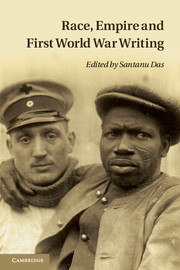Book contents
- Frontmatter
- Contents
- List of illustrations
- Acknowledgements
- Notes on contributors
- Introduction
- PART I VOICES AND EXPERIENCES
- 1 ‘An army of workers’: Chinese indentured labour in First World War France
- 2 Sacrifices, sex, race: Vietnamese experiences in the First World War
- 3 Indians at home, Mesopotamia and France, 1914–1918: towards an intimate history
- 4 ‘We don't want to die for nothing’: askari at war in German East Africa, 1914–1918
- 5 France's legacy to Demba Mboup? A Senegalese griot and his descendants remember his military service during the First World War
- PART II PERCEPTIONS AND PROXIMITIES
- PART III NATIONALISM, MEMORY AND LITERATURE
- Index
- References
2 - Sacrifices, sex, race: Vietnamese experiences in the First World War
Published online by Cambridge University Press: 05 February 2014
- Frontmatter
- Contents
- List of illustrations
- Acknowledgements
- Notes on contributors
- Introduction
- PART I VOICES AND EXPERIENCES
- 1 ‘An army of workers’: Chinese indentured labour in First World War France
- 2 Sacrifices, sex, race: Vietnamese experiences in the First World War
- 3 Indians at home, Mesopotamia and France, 1914–1918: towards an intimate history
- 4 ‘We don't want to die for nothing’: askari at war in German East Africa, 1914–1918
- 5 France's legacy to Demba Mboup? A Senegalese griot and his descendants remember his military service during the First World War
- PART II PERCEPTIONS AND PROXIMITIES
- PART III NATIONALISM, MEMORY AND LITERATURE
- Index
- References
Summary
With the mobilisation of its able-bodied men during the First World War, France turned to neighbouring countries and the colonies, including Indochina, for manpower. Between 1915 and 1919, 48,922 Vietnamese soldiers and 48,254 Vietnamese workers were recruited to serve in France. Some recruits were sent to Africa, the Balkans and the Middle East, but the great majority went to France. They were sent to battlefields, factories, hospitals, construction sites, commercial businesses, and agricultural regions to work as soldiers, military labourers, factory workers and farmers. The Vietnamese experience of the First World War has not attracted much attention, apart from occasional discussion in histories of Vietnam, where it has been the source of some debate. Nguyen Ai Quoc (or Ho Chi Minh as he was later known) wrote in 1925 that all the recruits were conscripted, leading a number of historians to claim that the recruiting campaign, while ostensibly voluntary, was in fact based on conscription. However, fresh archival evidence and greater socio-historical contextualisation suggest, as I argue, that most recruits in fact did volunteer to serve for a variety of reasons: their desire to escape from their world of economic hardship, to see France, or to achieve some freedom from traditional social and moral codes.
- Type
- Chapter
- Information
- Race, Empire and First World War Writing , pp. 53 - 69Publisher: Cambridge University PressPrint publication year: 2011
References
- 3
- Cited by

